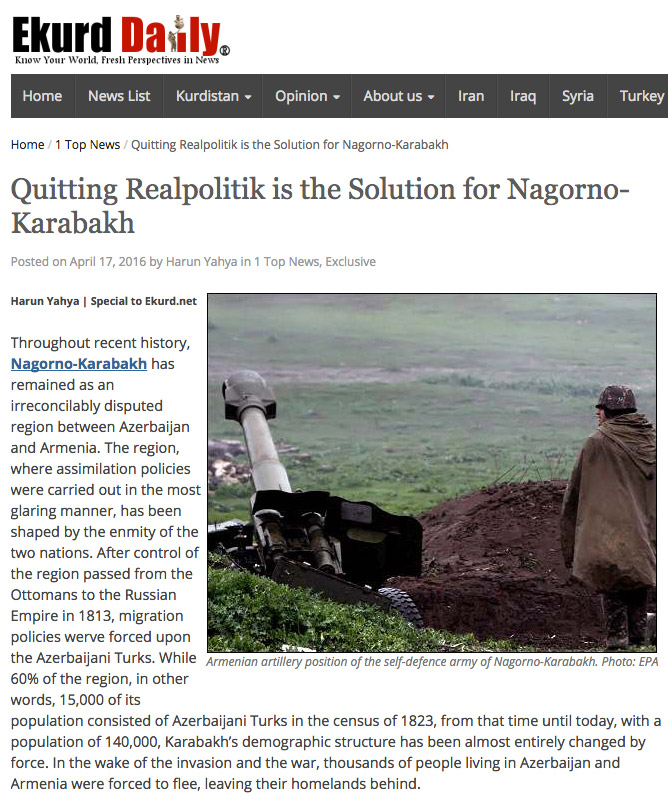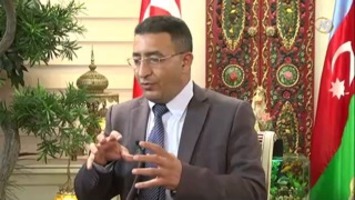Bigotry: The Dark Danger
Quitting Realpolitik is the Solution for Nagorno-Karabakh

Throughout recent history, Nagorno-Karabakh has remained as an irreconcilably disputed region between Azerbaijan and Armenia. The region, where assimilation policies were carried out in the most glaring manner, has been shaped by the enmity of the two nations. After control of the region passed from the Ottomans to the Russian Empire in 1813, migration policies werve forced upon the Azerbaijani Turks. While 60% of the region, in other words, 15,000 of its population consisted of Azerbaijani Turks in the census of 1823, from that time until today, with a population of 140,000, Karabakh's demographic structure has been almost entirely changed by force. In the wake of the invasion and the war, thousands of people living in Azerbaijan and Armenia were forced to flee, leaving their homelands behind.
In the 20th Century, following the British occupation of the region, the first major conflicts between Armenians and Azerbaijanis began after the Bolshevik Revolution of 1917. Following the First World War, the English occupied the region for a short time, and after that, the region came under the rule of the Soviet Union.
Towards the end of the 20th Century, the "Nagorno-Karabakh" region continued to remain one of the regions of the Caucasus that witnessed some of the most intense conflicts. Being entirely located within the territory of Azerbaijan, the region was occupied by Armenia at the beginning of the 1990s: In that war, which escalated sharply between 1991 and 1993, seven towns belonging to Azerbaijan were invaded by the Armenian forces. Declared in 1992, The Nagorno-Karabakh Republic to this day has been recognized by no international organizations and countries, including Armenia.
The biggest conflicts since the ceasefire between the two countries declared in Bishkek, the capital of Kyrgyzstan, in 1994 occurred in the current month of April, 2016; both sides sustained losses. The Ministry of Defense of Azerbaijan announced that they had recaptured certain strategic areas that were under Armenian occupation. Invasions and conflicts continuing unabated for two hundred years once again grabbed the headlines in the Caucasus. The conflicts did not appear to cease as a specific and deliberate policy of conflict was being carried out over Karabakh. Those who suffered in the meantime were the people of Azerbaijan and Armenia; two nations that are supposed to be brothers could in no way reconcile and come together.
The Realpolitik World View and War Will Only Lead to Suffering for Karabakh
Wars cause nothing but bloodshed, suffering and destruction for the societies involved. As it turns out, the clashing interests of the deep states of the world's superpowers are behind the wars and international political issues of today. These conflicts of interest have been accepted as a matter of realpolitik and are considered a normal prerogative of international politics.
The concept of realpolitik is the product of a loveless system that trivializes human life, views deaths as statistical data, and defends state interests in a way that is far removed from the norms of the law, human rights, honor, dignity and virtue. Even though it is not stated openly, the most basic things that nourish this system are wars, terror and anarchy. Therefore, conflicts of interest are inherent in this system, and these wars are supported and instigated by certain shadow states.
This system is an inhumane political system that compels countries into ruthless machinations of power and advocates merciless foreign policies based upon national interests. Under the influence of the deep state structures that hold sway over powers such as Russia, the USA, Iran, England, China, EU and the Shanghai Five, the wars, violence and destruction in the Caucasus and the Middle East are being promoted and continued without end. The Karabakh issue is also a matter of the shadow state as well; therefore it has remained utterly unresolved for the last two centuries.
The Solution for Karabakh
First and foremost, a new political spirit should take hold that will show the wrongness of realpolitik ideas. All countries have to believe in the fact that the road to development is paved with unity and solidarity, not matters of self-interest. Of course it is not expected that such a thinking will happen overnight. The current global nature of politics is a far cry from the spirit of solidarity that will make this possible. However, this situation by no means stands in the way of the emergence of pioneers that will accomplish this.
Turkey, which follows the Karabakh issue closely, might become one of these pioneers. Turkey should step in to bring both sides to reconciliation. The solution to the issues should be sought through pursuing peaceful and conciliatory policies in the Caucasus -not through war. Responsible nations can never be the advocates of enmity and war between countries. For this reason, it is crucial for Turkey to become the leading player of a policy of unity and solidarity that will reach the hearts of both Azerbaijani and Armenian people.
Especially since the 1980s, Armenia has been under a trade blockade by Turkey and Azerbaijan that supply almost all its trade. The borders were shut, and Armenia virtually withdrew into itself turning into an economically collapsing country. The Trans-Anatolian Gas Pipeline Project, TANAP, is a project that will carry Azerbaijani and Caspian Sea natural gas to Europe and Armenia has remained outside of this project as well. Not being able to visit Anatolia and the Caspian, the Armenian people become distanced to the regions that have been their neighbors for centuries and in which their relatives live and no one desires this situation. This atmosphere of distress is of no benefit to anyone whatsoever.
Russia is being led into a sense of unfounded unease and forced to develop policies that are to the detriment of Turkey. The recent softening of these policies has been met with contentment by Turkey. The Karabakh issue should be turned into an opportunity to reconcile Russia and Turkey, and a common ground of agreement should be established to achieve permanent peace. It should not be forgotten that having Russia as a powerful allied country is to Turkey's benefit; also a friendly Armenia who has reconciled with Azerbaijan is to the benefit of Turkey as well. It will bring greater stability to both the Caucasus and the Middle East for Turkey and the Islamic countries to come together and enter into a beautiful solidarity, including Russia and Armenia in this unity as well. The aforementioned situation will also lead Turkey to enter into more economic and cultural cooperation with Russia and this will also lead Azerbaijan to become stronger, and by continuing its policies favoring both Turkey and Russia, Azerbaijan will be a considerable moral and material supporter for both countries. Such an alliance in the Caucasus will also ensure the stability and trade opportunities in the region.
Turkey can become the pioneer country in this regard. The most crucial point in achieving this is to prioritize peaceful policies, and to act in a determined fashion to protect the oppressed nations without being influenced by the gruesome policies and war-mongering of the world's shadow states.
Adnan Oktar's piece in EKurd Daily & Daily Mail:
http://ekurd.net/solution-nagorno-karabakh-2016-04-17
http://dailymailnews.com/2016/05/01/quitting-realpolitik-is-the-solution-for-nagorno-karabakh/
2016-04-17 16:48:40

_09.jpg)

